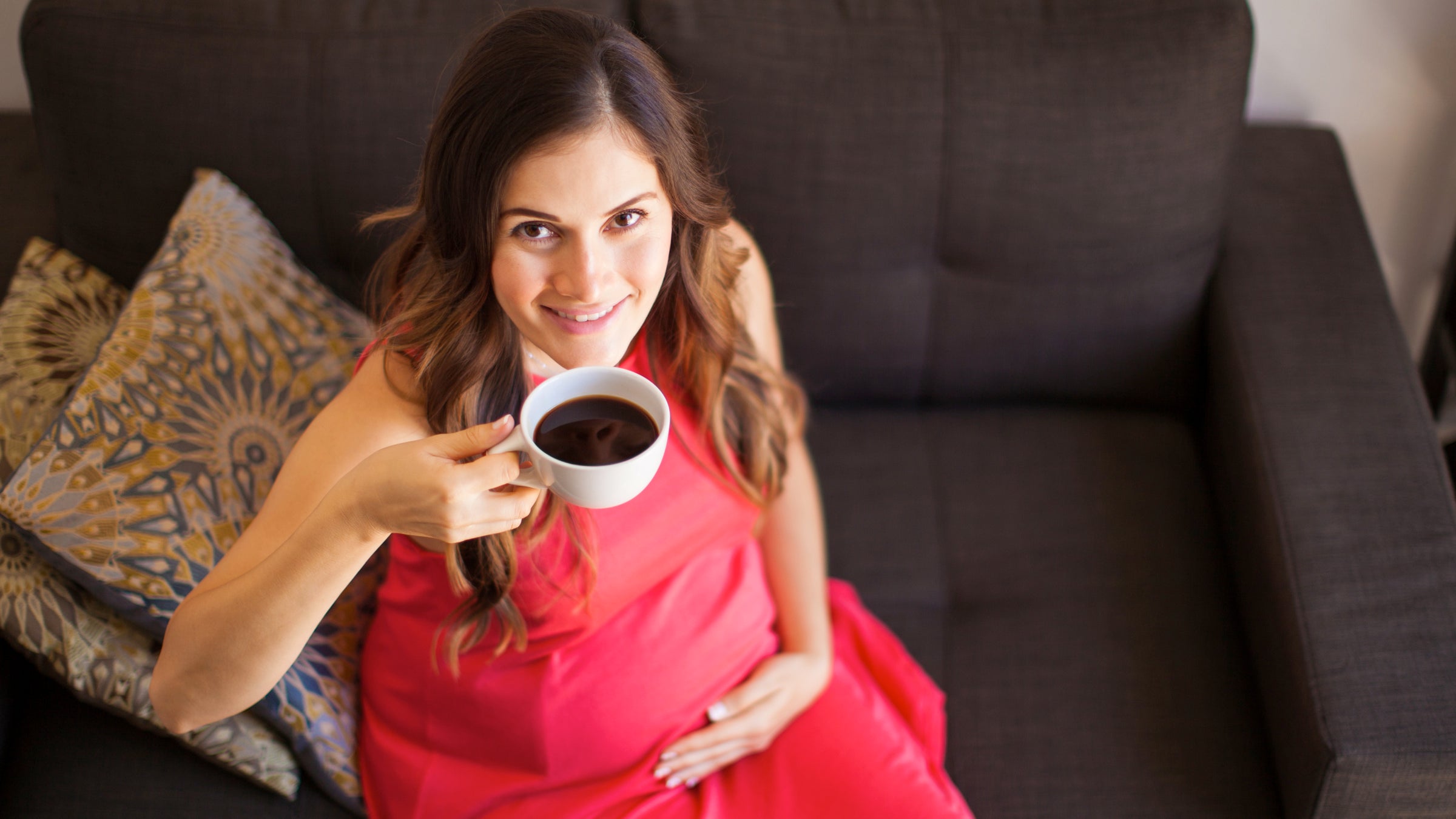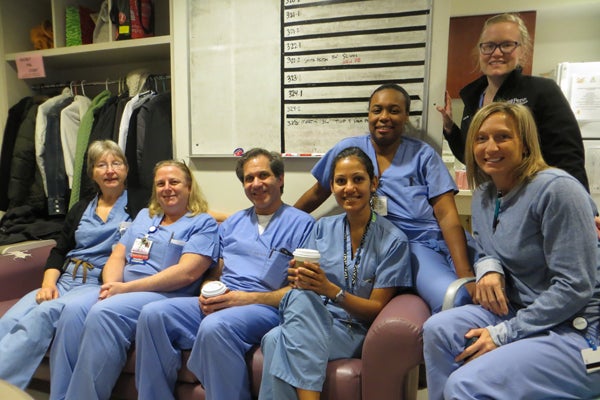Navigating the do’s and don’ts of pregnancy
Listen Photo via ShutterStock)" title="pregnant drinking coffee" width="1" height="1"/>
Photo via ShutterStock)" title="pregnant drinking coffee" width="1" height="1"/>
Is it okay to drink coffee when you're pregnant? (Photo via ShutterStock)
Some ‘rules’ for expecting women come with wiggle room.
There are countless do’s and don’ts to think about during pregnancy, and every mom has her own way of figuring out what works for her.
In Philadelphia, Michiko Hunt says, with her first baby, she was almost looking for rules to follow. With each week of her pregnancy, she was reading– and Googling — everything.
“And I’d click on all those websites that said: ’10 things you definitely shouldn’t eat,” Hunt said.
But Hunt has a big circle of laid-back girlfriends, and eventually their practical ‘woman wisdom’ helped her relax into her decisions. Now, she’s pregnant again, 13 weeks, with baby number two.
With a toddler at home, Hunt has less time to obsess over what the Internet says. But, she does listen to her doctor.
“I haven’t defied anything she suggested, I also haven’t felt she’s been pushy or very black or white about things,” Hunt said. Her physician shares recommendations—explains why she’s offering them, then tells Hunt: “You can choose to do what you like.”
There’s something about a pregnant woman–maybe it’s the big belly–that seems to invite unsolicited opinions. Expecting moms don’t just hear from their health providers, lots of well-meaning people with no medical expertise offer their wisdom, too.
There’s nuance to almost all the do’s and don’ts for pregnant women, but what starts as medical guidance sometimes gets shorthanded by laypeople into hard-and-fast rules.
“That’s annoying,” said Nancy Armstrong, a south Philadelphia mother who’s 34 weeks pregnant with her second son. “I’m a grown-up,” she said. “I can decide for myself.”
Colleen Enuco, who’s 30 and lives in New Jersey, is expecting her second child early next year. With her due date so close, she’s in the doctor’s office every other week.
“I’m always very honest, I say: ‘I had a small glass of red wine last Saturday night,’ I haven’t got any sort of feedback from my doctor about that, they just breeze right by it,” she said.
Enuco works full-time in a separate job but is also training to become a sommelier. She says wine is part of her lifestyle and now that she’s in her third trimester, she’s comfortable having an occasional drink. She was out with her husband recently and had a glass.
“I mean it was like a spit of wine,” Enuco said. “I just wanted to taste the wine. And I’m like tasting it and I realize, I guess maybe I should have a worn baggier clothing or whatever, so it wasn’t so prominent that here’s this pregnant lady tasting wine. You get the eyes.”
Nancy Armstrong says during her pregnancy, she’s gotten ‘dirty looks’ when she’s running on the treadmill at the gym. She kept running. “My doctors all say: as long as it feels good keep doing it,” Armstrong said.
During her first pregnancy, Armstrong was restless over a recommendation that she only sleep on her left side.
“I was very nervous about it first time around,” she said. “At this point, being rested is more important.”
Enuco is a vegetarian and has been a bit worried about the bacteria risks in kale and spinach, but no one’s suggesting she give up leafy greens.
“It’s just one of those things to keep an eye on. So of course, every time I eat it, I’m like: ‘ugh, crossing my fingers,’ but it’s not going to stop me because I’d be really low on iron, very tired,” Enuco said.
Obstetrician-gynecologist Sabrina Sukhan–attending physician at Pennsylvania Hospital in Philadelphia—and her colleagues from the labor and delivery team gathered in the break room to talk about pregnancy recommendations and myths.
Around the table, there were two nurse midwives, a couple of senior physicians, a labor and delivery nurse and a resident. All wore blue scrubs and a few had on those comfy, rubber-soled clogs that let health workers stand for hours.
Health providers have just a few months to do all the counseling and education they’re supposed to do. So unless she’s talking to a close friend, Sukhan sticks to the script from the American College of Obstetricians and Gynecologists.
“If I’m not on the clock, absolutely, I might have a full discussion about what the scientific research actually shows as opposed to what the party line is,” Sukhan said.
Soft cheese is actually OK. It’s unpasteurized dairy, that’s the problem.
Doctors recommend 30 minutes of daily exercise. But pregnant women often have trouble with balance and their center of gravity shifts, so some health providers discourage anything with a big risk for a fall, such as horseback riding or surfing.
Yoga’s great, Sukhan said. In a small study published in the so-called Green Journal (required reading for ob-gyns) 26 different poses were well tolerated by healthy pregnant women and their fetuses.
Sukhan says do something, but do what you know.
“So if you’ve never trained for a marathon, pregnancy is not the time to train for one,” she said.

The labor and delivery team at Pennsylvania Hospital in Philadelphia. Ob-gyn Sabrina Sukhan (fourth from the left) says she usually offers advice to patients that has been vetted by the American College of Obstetricians and Gynecologists. (Taunya English/ WHYY)
“Sushi and sex, both fine,” said nurse midwife Christie Werynski.
That’s an opinion Philadelphia mom Nancy Armstrong would probably be happy to hear.
“There’s a spicy tuna salad that I really like,” Armstrong said. “I wanted to eat it more than once while I was pregnant this time, and I’m like, you know what, I’m just going to eat it, I think I’ll be fine.”
Werynski advises women to only go to restaurants that they trust. Sushi in the United States is usually flash frozen so parasites aren’t a big worry, but even garden-variety food poisoning can be more severe if you’re pregnant—so some women decide it’s easier to just skip sashimi for a few months.
Werynski says her patients deny themselves in other ways, too.
“They are very paranoid that the baby is going to be affected by having intercourse,” she said. “Unless the woman has a medical contraindication, then sex is perfectly safe in pregnancy.”
Obstetrician-gynecologist Peter Gearhart says you can also keep your standing appointment at the beauty salon.
“You have to look good to feel good, hair dye’s OK, as is nail polish,” he said.
Years ago, doctors worried about the chemicals in hair coloring. But these days, those chemicals have been well studied, Gearhart said. The dye is applied to the hair—which is mostly dead cells–and very little gets absorbed into the skin.
Nurse midwife Nancy Hazle says women are usually quick to take her suggestions, but many patients struggle to give up cigarettes.
“They want to stop, they can’t stop,” she said.
Hazle says there’s plenty of handwringing over sushi and hair dye, but at the top of her list of pregnancy rules is: Get a flu shot. A bad bout of influenza can really hurt a pregnancy.
Hazle tells moms not to drink. But, she makes an exception for New Year’s Eve and other big celebrations—as long as it’s not the first trimester—and only if it’s an ‘incredibly small amount.’ But for Peter Gearhart, there are no exceptions.
“If you need to celebrate, you can have a ceremonial toast, touch it to your lips, but it’s best not to drink,” he said.
Drinking alcohol—including wine and beer–during pregnancy can cause birth defects and developmental problems for a fetus.
“The fetal brain is a rapidly developing organ, you never know at what point in the development process something could get in there and interfere with that,” Gearhart said. “Alcohol is know to have significant affects on the central nervous system.”
The newest public health message is “not one drop” during all nine months. But in some countries, that message is followed by advice about how much to drink, if you decide you are going to drink. There’s lots of conflicting advice.
A new book called “The Science of Mom” explores the decisions parents make. Author Alice Callahan from Oregon was trained as a researcher and has a doctorate in nutrition, so it was natural for her to dig into the science to find answers when she was pregnant.
“It takes a little while to straighten out what’s evidence-based and what are the sort of myths about pregnancy that aren’t as important,” Callahan said.
She has a 5-year-old daughter and an 11-month-old son.
The first time around, she avoided caffeine, but during her last pregnancy, Callahan was finishing a book and facing a big deadline.
“And I would hit this wall of fatigue in the early afternoon when I really needed to keep my momentum up,” she said. Callahan decided to have a bit of coffee every day, and her obstetrician supported that decision.
“But it didn’t necessarily line up with what everybody else said, and I would still deal with these judgmental looks when I ordered my half-caf latte at the coffee shop–with my big belly,” she said.
Between the births of her children, Callahan experienced three miscarriages. That made her very careful, but also weary of unsolicited advice from strangers who imply she’d do something to hurt her unborn child.
“People think crazy things cause miscarriage, eating pineapple, stretching up too high, doing yoga, so they’ll offer that as advice and then, miscarriage is very common, so if that happens to you I think it’s very common after a miscarriage to wonder if there’s something you could have done differently, so that’s where those myths can really be hurtful to women,” Callahan said.
Most pregnancy recommendations come from big teams of public health experts.
“They do have to make sort of simple recommendations for an entire population,” Callahan said.
We all deal with uncertainty every day, and individual moms do the risk-benefit analysis, factoring in their own health and their own situation.
There’s no need to swaddle moms in bubble wrap for nine months. Expecting women can do most things in moderation, said obstetrician-gynecologist Peter Gearhart.
WHYY is your source for fact-based, in-depth journalism and information. As a nonprofit organization, we rely on financial support from readers like you. Please give today.



